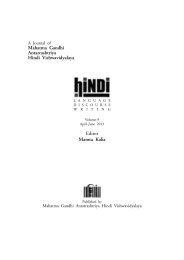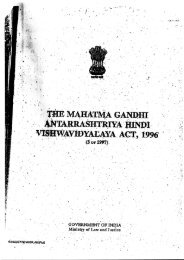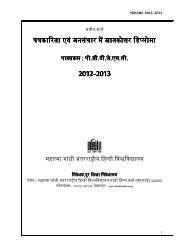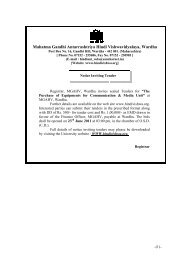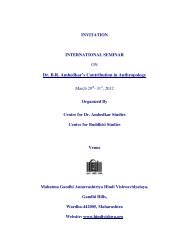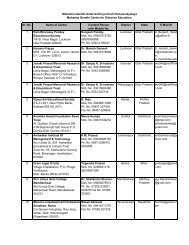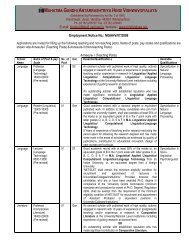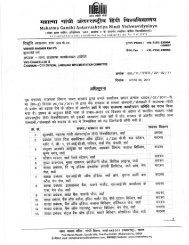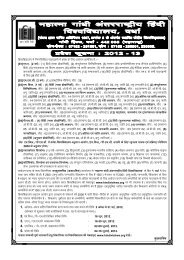Mamta Kalia
Mamta Kalia
Mamta Kalia
Create successful ePaper yourself
Turn your PDF publications into a flip-book with our unique Google optimized e-Paper software.
According to Jameson and<br />
Baudrillard, the commodification of late<br />
capitalism has blurred the distinction<br />
between the economic and the cultural.<br />
Industrial production has been replaced<br />
by ‘semiurgy’ (Baudrillard)- the<br />
production of signs. Second, the<br />
epistemological orientation of<br />
modernism-‘ knowing’ –gives way to the<br />
antological orientation of postmodernism-<br />
‘modes of being’. Further,<br />
modernist self-reflexiveness, its urge to<br />
question itself and its own foundations<br />
in its search for essential timeless meaning<br />
is replaced by a post- modernist view<br />
of meaning as inevitably local, contingent<br />
and self-sufficient. Third, as Fiedler points<br />
out, the anthropocentrism, Eurocentrism,<br />
repressive and reductive rationalism and<br />
elitism of modernism gives way to the<br />
liberating, democratic, open, respectful<br />
to both humans and non-humans and<br />
sensitive to desire aspects of postmodernism.<br />
Further, existential post-modernists<br />
like William Spanos viewed that the<br />
criticism can make ‘a difference in the<br />
world’ and for this an existential subject<br />
is very much required. But he does not<br />
recognise the priority of language. In<br />
other words, he does not incline towards<br />
the rhetoric, towards the surrender to<br />
language and towards the ‘end of man’<br />
(Derrida’s terms).<br />
In his book, ’The Post-modern<br />
Condition’: A report on knowledge, (1984)<br />
J.F. Lyotard defines post-modernism as<br />
a distrust or ‘incredulity towards meta-<br />
narratives’. To him, modernity sees<br />
history in context of two major myths;<br />
history as a story of the freedom (as<br />
originated in the French revolution); myth<br />
of history as turning of the ideal into<br />
real through logic. But Lyotard considers<br />
that talk about humanity for modernity<br />
is to get entangled in the universalism<br />
of enlightenment and this gives birth<br />
to integrated metanarrative, whose<br />
tendency is autocratic. So he wants the<br />
replacement of manufacturing of material<br />
goods by the information as a central<br />
concern in post-industrial societies (of<br />
the west). Now, he says, knowledge has<br />
become ‘an informational commodity’<br />
and science has abandoned its original<br />
integrity and has become just an<br />
instrument in the hands of power. Meta<br />
or grand narratives justify the objective<br />
of western civilisation as ‘whiteman’s<br />
burden’ is popularly spoken by the so–<br />
called rational western elites. But, now<br />
these meta narratives have been replaced<br />
by the numerous ‘language games’ (to<br />
use Wittgenstein’s terms), ranging from<br />
Wittgenstein’s modes of discourseseveral<br />
forms of utterance (denotative,<br />
performative, prescriptive, etc) to the<br />
discourses used by social institutions<br />
and progressions to full scale narrative.<br />
These language games may have only<br />
limited social and historical validity due<br />
to their very nature. In French postmodernism<br />
there have been two camps:<br />
Saussurean Camp - (the early Barthes,<br />
Lacan and Derrida) focusing on language<br />
& structure and Nietzsehe’s Camp-<br />
(Foucault, Deleuge, Guattari) focusing on<br />
April-June 2010 :: 71



